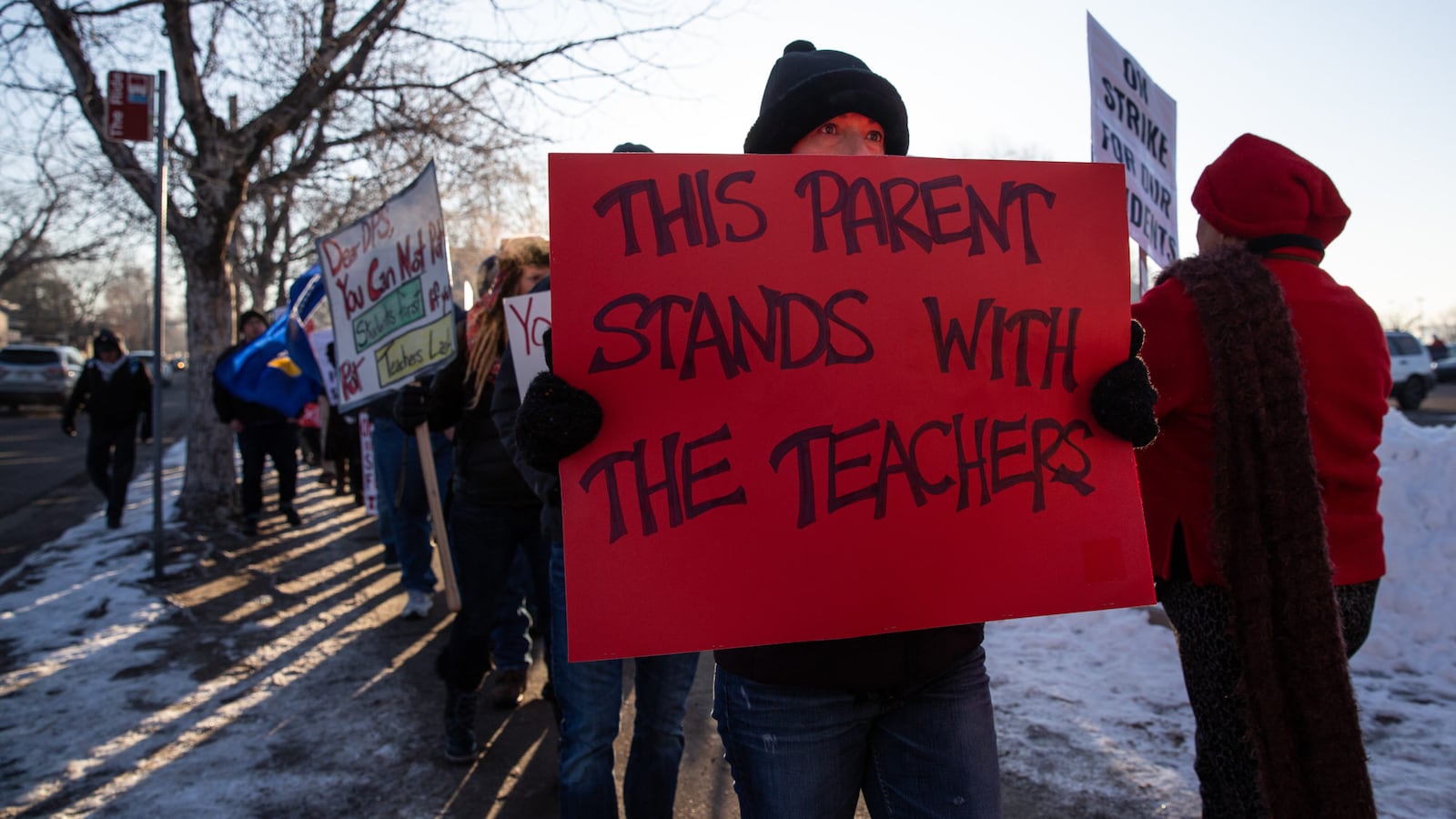A teacher strike is more than a labor dispute between employees and management. It’s a morality play — with audience participation.
Many parents are seizing the chance to take the teachers’ case to elected officials. At the same time, those siding with the district on a key aspect of its pay policy are also trying to sway public opinion.
Denver Public Schools teachers have been on strike since Monday seeking higher pay and changes to a system of bonuses they say has made their compensation too unpredictable.
A post on a public Facebook page called Fair Pay for Denver Teachers calls on parents to write to Superintendent Susana Cordova and Denver school board members, and to copy members of the media. Union supporters are encouraging parents to describe chaotic conditions in their children’s schools during the strike, and to plead with the district to meet the teachers’ demands so that they’ll return to their classrooms.
“I am the mother of a kindergartner at University Park Elementary,” Molly Casey wrote in a letter to the district that was shared with Chalkbeat. “She attended school yesterday and came home anxious and upset. Going back to school today was upsetting for her. I know that is not how you want our children to feel. Please settle with the teachers and pay them what they are worth.”
In another letter, signed Bridget M., a fourth-grader at Park Hill Elementary wrote that she misses her teacher and would like things to get back to normal.
“I would like to tell you about my day at school today,” she wrote. “It was not very exciting or educational. We watched movies and played games, even though those things are fun it was very boring. I would like to say also we were wondering about the Valentine’s Day parties, how will those turn out, will we even have them?”
“Please pay the teachers fairly,” she concludes.
But what does “fairly” look like?
District officials have agreed to increases in base pay but want to keep more teacher compensation in the form of bonuses, particularly for teachers at high-poverty schools where turnover is high. The union wants fewer bonuses, with the difference put into higher base pay. They believe that will do more to keep teachers in hard jobs.
In an op-ed in The 74, Landon Mascareñaz of A+ Colorado, a group that supports many education reform policies, argued that Denver teachers were seeking to increase their pay at the expense of students of color in high-poverty schools.
Mascareñaz pointed to a letter signed by some civil rights groups in support of the incentives and questioned why union leaders didn’t go to an event at Manual High School to talk about how the two sides’ proposals would address longstanding inequities in Denver Public Schools. (It’s worth noting that other organizations that often speak up for students of color did not sign the letter or have sided with the teachers union because they see the equity question differently.)
“In a startling reveal of the union’s valuing equality over equity, it wants significantly lower incentives for teachers who work in high-needs schools,” he wrote.
In a blog post, Van Schoales, also of A+ Colorado, argued that rather than take money from incentives to boost pay, the Denver district should dramatically increase bonuses for teachers at high-poverty schools. And in an op-ed in The Denver Post, former mayor Federico Peña and Denver Scholarship founder Timothy Marquez argued that both sides risk violating the deal they made with voters back in 2005, when they approved a special tax to fund the bonus system, which is known as ProComp.
Meanwhile, the letters from parents to the district keep coming.
“There was a kindergartner who asked me to call his mom so that he could go home within the first 30 minutes of the day and then several times after that,” parent Molly Garcia, who is also a paraprofessional not covered by the teacher contract, wrote to the school board in yet another letter shared with Chalkbeat. “There were kindergarteners asking if they could have some actual work to do. There were kindergarteners asking if their teachers would be back tomorrow. There were kindergarteners telling me they were bored. There were kindergarteners acting out more than they usually do.
“We NEED our teachers. They know how much WE value them, I just wish the district would value them too.”

